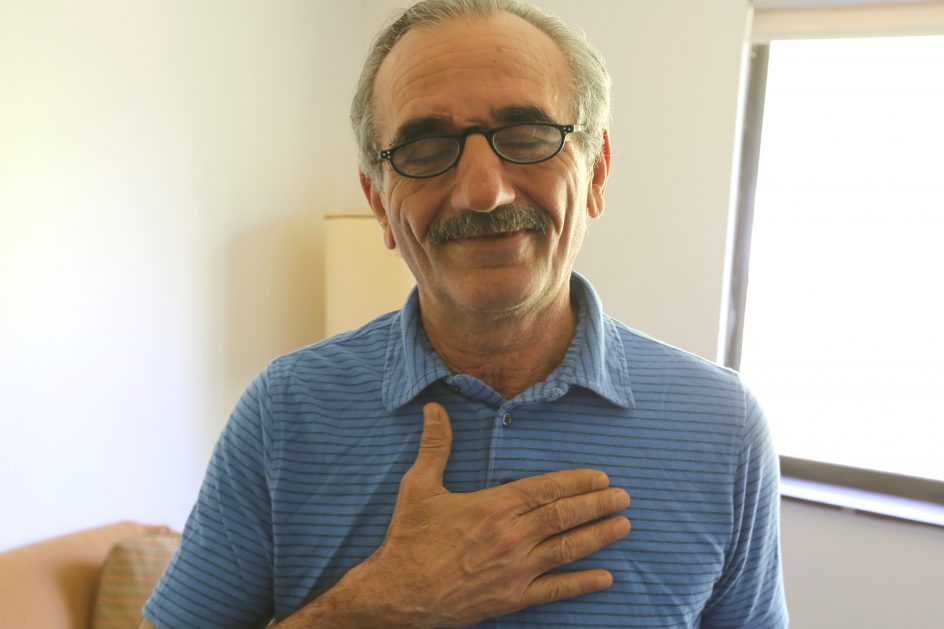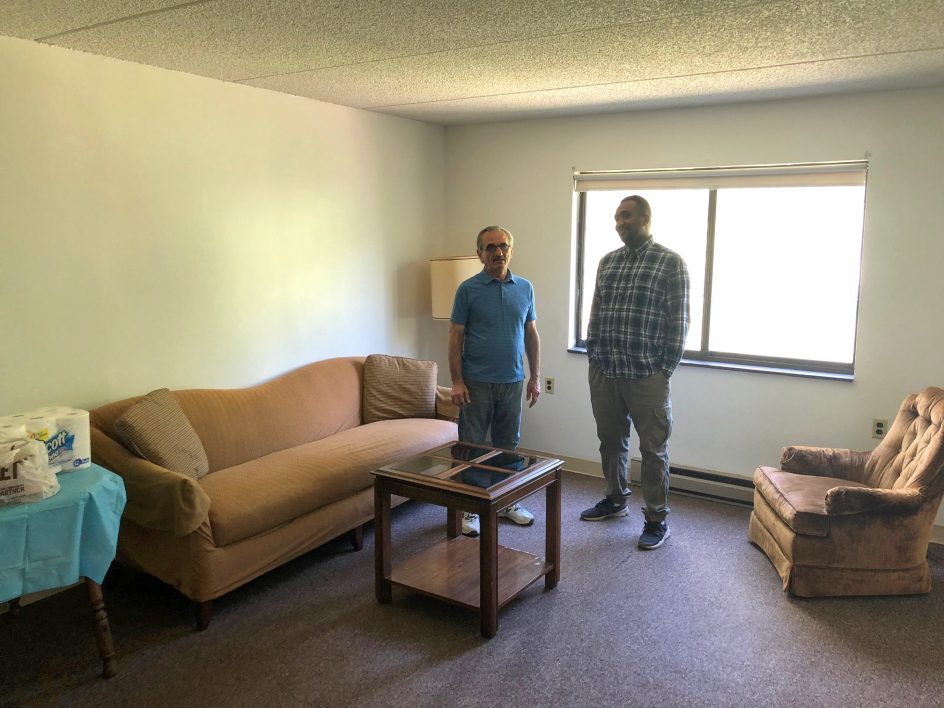
Saad moved into his new apartment in a huge senior citizen apartment complex just outside fo Albany last week, he likes his apartment very much – it is his first real home since fleeing religious extremists in Baghdad more than a year ago. He has lost every single thing but his own life, and he nearly lost that.
Saad has endured a lot on his journey to America from Baghdad.
He lived in a one room apartment in Los Angeles with two other refugees, and had to leave Los Angeles, it was too expensive and his apartment was being turned into condos. He came to Albany and slept on the floor of another one room apartment until it too, was sold, and he was desperate to find another apartment. .
Saad now receives a stipend every month from Albany.
He has enough money each month to pay for his apartment – the rent is $244, – but not for too much else. In this work, we think small and keep our expectations low, but I recognize that Saad will need some help for some time. He has absolutely nothing of his own.
Our own resources are limited, but we can help him gradually and thoughtfully to fill out some of the gaping holes in his life.
I was interested to see 15 different prescriptions lined up in plastic pill containers and also struck by the spareness of his apartment and the sense of loneliness and isolation in his life. He has no friends here, no family.
Saad has heart disease, diabetes and low blood pressure, yet he still talks of finding a job.
His believes he suffers greatly stress and the uncertainty of his life, and the loss of his family. His days are empty, there is nothing to do in his apartment. He left eight children and a wife behind in Badhdad, it is unlikely he will see them again any time soon.
We paid for the deposit on the apartment so Saad could move in.
There is absolutely nothing on the walls, and he has no car, cellphone, TV or Internet. We did collect some furniture from the churches – a bed, a sofa, a wooden table, a second small table for groceries and personal effects. There is nothing decorative of any kind on any of the walls.
But it feels bare and cold.
More and more, Ali and I are seeing refugees who suffered horribly in their home countries, somehow made it to America, and have been almost completely abandoned by our government.
The aid to refugees and immigrants is being slashed and eliminated almost continuously. Many refugees are trapped in this cycle of poverty and assimilation. They have no money, so they can’t buy a car, they have no car, so they can’t go to work or find work. Some have small children, and can’t afford day care, so they can’t go to work. Many families are run by single mothers, the fathers were killed or imprisoned or denied admission to the U.S.
They can’t compile good credit ratings, so they are denied access to many of the things they need.
Ali and I stopped at a grocery store in Albany today and bought Saad fruit, towel paper, toilet paper, toothpaste and a brush, some cereal and frozen fish. Last week, we gave him $400 for security despots.
So here is the plan Ali and I worked out.
We have to put something on the walls. One friend, a member of the Army Of Good, is going to buy some wall posters and send them to me. Maria came up with a linen map of Arabia which I will bring him for one of the walls. Another friend, an artist, is offering two of her water colors. He will need some floor lamps.

This afternoon, I ordered a 32 inch Samsung TV for under $200.
We are paying a one month deposit for cable and Wi-Fit to be installed in the apartment. Saad can pay the monthly fees, he just has nothing left over for the deposit. Ali can install the TV and show him how to find the Arabic channels.
Then, he can watch television programming and perhaps re-connect with his culture and country. In Iraq, we know he was successful and prosperous.
I noticed his hands shaking severely every time he tried to lift or move something.
He said he thinks this is low blood pressure, but I don’t think that. We are going to get Saad to a doctor. I have never seen anyone as alone as Saad is right now.
My mind keeps going back to the loneliiness. There are communities of refugees around Albany, Ali will help to connect Saad with them.
There is no one in his huge apartment complex who speaks Arabic, and the only way he can get out the apartment is to take a bus. We are looking into getting him a free pass for senior citizens, Saad is in his 60’s.
He is taking English lessons at RISSE, the refugee and immigrant support group.
A former U.S. Embassy worker during the war, Saad had to flee Iraq recently when he was targeted by religious extremists for helping the United States. He fled to a UN refugee camp and was brought to the United States. He was given no assistance when he arrived, and has not heard from the federal government since.
He spends all day alone his apartment, sometimes taking the bus to visit RISSE and get some food. The staff used to find him standing outside in the cold in the morning, trembling.
Saad asked me today if I thought he could get a job driving a car for Uber, he proudly showed me his driver’s license. But I told him since he spoke no English, and has no car, I didn’t see how it could happen. He could not afford the car, let alone the insurance.
He is eager to work, and is intent on looking. His doctors have told him he should not work. The easiest thing to do is to get some color into the apartment – paintings, posters, some color and warmth. I can arrange that by next week.
Then the TV, which is coming on May 15 and which will give him something to do and watch in his apartment, which is safe and comfortable but far from his world.
Then, we will try to get him a cell phone, hook up the new TV and set him up on the Internet, where he can access the Arabic speaking channels. He has to get his tremors checked out, they are severe. That is all doable and relatively inexpensive. Technology can help connect and reconnect him to people.
Then we’ll stop and reassess. We have to be deliberate, even ruthless, about what we can do. There is a long list of people waiting for help. Ali constantly reminds me of the limits, he has a great feel for the boundaries around this work.
If you want to help us get Saad acclimated and settled in America, that would be great.
He was loyal to the United States, and has paid dearly for it. There is virtually no chance his family – his eight children – will be admitted into America under this administration. Officials reported last week that the United States has accepted fewer than 17 Syrian refugees in the past year, out of 5.5 million refugees living in camps due to the civil war there.
Saad must completely rebuild his life here with little support or resources.
We can help him, though, to get stable and off to a good start. We can help in small ways, fill some of the holes. Then we have to move on. . He says he is grateful to be alive, and grateful for what he has. I understand boundaries only too well.
Saad is independent and doesn’t want anyone to run his life for him. He is a sweet and gentle man caught in many ugly storms of other people’s makings.
If you wish to help with this refugee work, you can send a contribution to the Gus Fund, c/o Jon Katz, Post office box 205, Cambridge, N.Y., 12816., or via Paypal, jon@bedlamfarm.com. Please mark it “refugees.”
And thanks for helping Saad.
